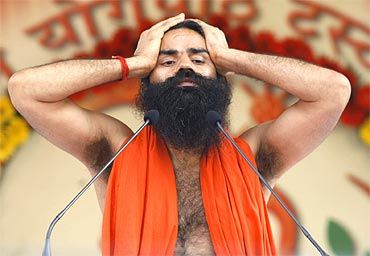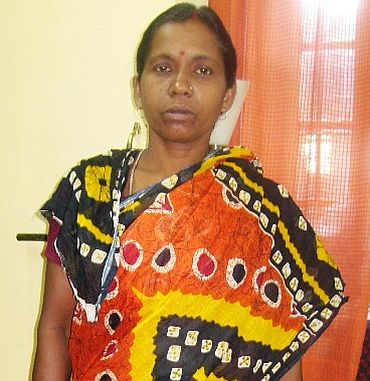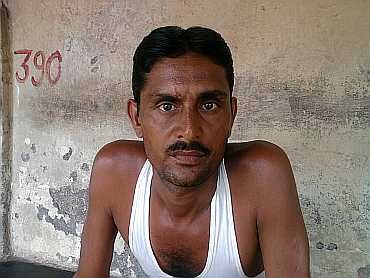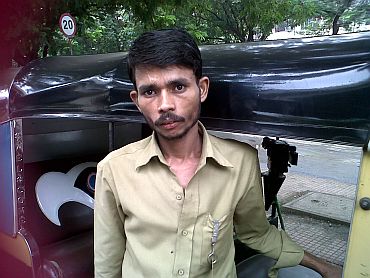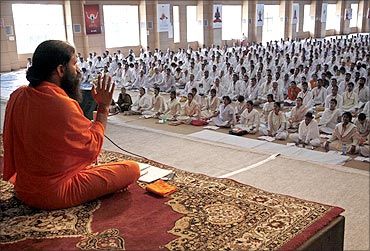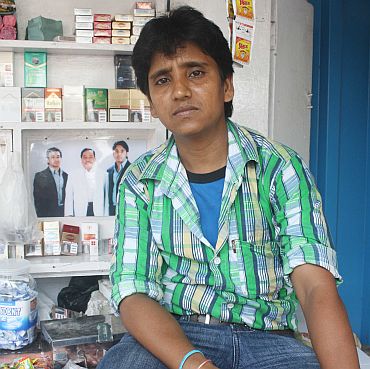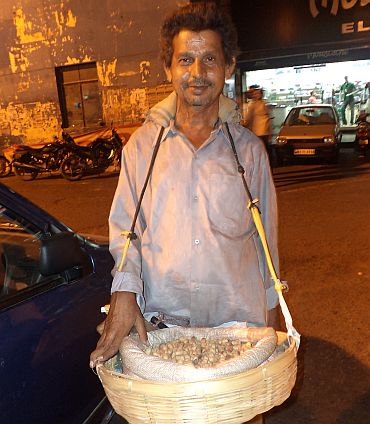 | « Back to article | Print this article |
What aam admi thinks of Baba Ramdev's crusade
Amid much political hullabaloo, yoga guru Baba Ramdev begins his indefinite fast against corruption at the Ramlila Ground in New Delhi on Saturday.
A visibly anxious Congress-led United Progressive Alliance government is going over cautious to tackle the imminent storm principally against black money stashed abroad raked by the immensely popular yoga guru. Meanwhile, opposition parties see this as another ripe opportunity, after the widely accepted Anna Hazare campaign, to further corner the scam-hit government at the Centre.
Some political quarters are leveling allegations on the yoga guru himself, who sits on an empire allegedly worth Rs 1,100 crore.
There are also those who define Baba's crusade against corruption as 'another suspicious political drama with vested interests.' At the same time, others find Baba's agitation as the best way to tackle the menace of corruption which has reached insurmountable levels.
Rediff.com correspondents across the country spoke to the aam admi, unanimously battered by corruption in one way or the other, on how they perceive the episode. While some are unaware, others think it is the much-needed remedy to counter corruption.
'The way Baba speaks makes me laugh'
To Purnima Bairagi, Baba Ramdev is the squint-eyed saint who teaches people to keep fit with 'exercise'.
She has seen him many times on television while mopping the floors at the house where she works as a maid.
She was amused by the way the Baba speaks. "Onar kotha barta shunle hasi paye (the way he speaks makes me laugh)."
However, Purnima has no clue about either the Lokpal bill or Anna Hazare's fast over the issue some time back.
She does not know who Hazare is.
"Oto somoy kothaye didi? 3,500 takaye songsar chalabo ki kore sei bhebei din raat kaate (where is the time to think of such big issues? Having to keep the kitchen stove burning with a paltry monthly earning of Rs 3,500, I don't have any time to think of anything else.)"
Ask her if she herself has been a victim of corruption, pat comes the reply: 'Members of the legislative assembly and Parliament are robbers.'
"The local panchayat leaders in my native village refuse to 'grant' us below poverty line cards as we could not cough up Rs 5,000-bribe. It's a mad country run by the hooligans called leaders," she adds.
'Whatever Guruji is doing is right'
It's been only two days that Ram Singh has come to Mumbai from Jaipur, Rajasthan, and sells paan and cigarettes to earn a living. With a family of six -- that consists of three boys, one daughter and his wife -- Ram Singh manages to earn Rs 90 to Rs 100 every day.
With this kind of income, reading a newspaper every day is a luxury that he cannot afford. So he makes do with small talk amongst friends and customers to keep him abreast of what's happening around the world.
"Yes, I know Baba Ramdev," he says when asked if he has heard about this yoga guru who is taking on the mighty establishment in his attempt to rid India's polity of corruption
"Isn't he the one who teaches people various asanas (yoga poses) and their benefits to people?" he asks.
On prodding Ram Singh about Baba Ramdev's fight against corruption that he has taken into the heart of the capital, he feigns ignorance. "I don't know what he is doing in Delhi," he says without making eye contact.
Though he says that he has not encountered instances of corruptions personally, he contradicts himself by accepting that he has bribed people for getting his work done.
When asked if has to pay a hafta (a monthly bribe collected by municipal officials for allowing illegal, unlicensed shops to carry on with their businesses) to run his paan shop, he refuses to answer.
But he has this to say: "Kaam karane ke liye paise diye hai, dene padte hai (We have to pay bribes to get our job done and I too have bribed local government officials)," he says.
He, however, supports Baba Ramdev in his bid to get the black money laundered out of the country back into the treasury.
"Whatever Guruji (Baba Ramdev) is doing is right and I think everybody must support him," he says.
'I know Baba Ramdev, but have no clue about his campaign'
Ganesh Singh is 35 years 'ya aisa kuch (or thereabouts)' and drives a rickshaw in Thane, the satellite town of Mumbai.
He makes a little over Rs 300 every day. When he drives, he loves listening to Bhojpuri music at inexplicably loud volumes and frowns when you ask him to turn it off.
Singh came to Thane in 1994 and after bumming around for four years ('kuch nahi kiya'), he decided to take charge of his life and started driving a rickshaw.
As a rickie, Singh faces corruption every single day of his life. Cops hiding behind signals and emerging from behind parked trucks is everyday for him.
In the last 12 years, he says, he has had to bribe them 'innumerable times'.
"Usually it's when they catch you breaking a signal," he says but adds that there are times when they 'just look for excuses'.
"Do you know Baba Ramdev?" I ask him somewhat unsure of what he may reply. He doesn't have a newspaper in his vehicle, something that is seemingly common in rickshaws in Thane.
"Yes I do!" he says promptly, "He talks about god and other such things. I've never been to his 'satsangs' but I've seem him on TV. That's how I know him."
Singh however has no idea about the yoga guru's fight against corruption.
"Nahi pataa saab," he confesses. "Hum toh apna kaam karte hain." (No clue, sir. I just mind my business.)
With that our conversation ends and Ganesh Singh scoots off before another cop decides to wave the rule book he can never read before him.
'Baba's agitation may help the poor and the poorest'
Dasharath Shirsat, 34, works as a peon in a suburban college in Mumbai.
When asked does he know Baba Ramdev, the man replies, "Yes I know him from television and newspapers. I have heard that he has embarked on a campaign against corruption."
"I believe poor people like me may get benefit once the corruption is eradicated and it may help the poor and poorest. Corruption is a social evil that has to go," Shisat adds.
Meanwhile, Kishore Ahire, 34, a security guard in Mumbai says that he knows that Baba Ramdev is a yoga guru, but he is not aware of his fight against corruption.
When asked about his views on rising corruption, the 'hopeless' man retorts, "What is there to tell about corruption?"
'I am not a follower of Baba Ramdev's teachings'
On a humid afternoon, 24-year-old Raj Lavara patiently sits in his tiny shop at Linking Road, Bandra, a suburb in Mumbai, where he sells cigarettes and cold drinks.
As I approach him and introduce myself as a journalist, he looks at me with a little suspicion, but when I tell him that I have come to speak about Baba Ramdev, he reluctantly replies, "I know who is Baba Ramdev. I watch him everyday in the morning as I surf my television. I am not a follower of his teachings, I rarely sit down to listen to him carefully," he says as he rests himself in his tiny shop.
Whil Raj might not be a follower of Baba Ramdev, his younger sister is an avid follower who always buys ayurvedic products made by Baba Ramdev.
Raj is neither aware of Baba Ramdev's fast against corruption nor has he faced any corruption problems.
The shop that he runs maybe illegal but has been given to him by Congress leader Nitesh Rane whose office is just a stone's throw away from Raj's shop.
He proudly says, "Nitishsaab has helped me to set up my business. I spend most of time here as I have to support my family."
'I was attracted to his pictures published in local papers'
Baba ko maine utha-pathak kartein aur uchalte kudtein dekha tha,woh hanstein rahtein tha, (I remember having seen Baba doing yoga asanas and smiling) Arjun said in chaste Hindi.
Arjun starts his day early to earn his livelihood by selling peanuts. With a small bamboo basket hanging from his neck and touching his belly, he is aware that there were pictures of Baba Ramdev on the front page of local Hindi dailies on Friday.
"I did not read them, but his colourful picture drew my attention when I was selling peanuts to a man near a garment showroom" Arjun said.
But Arjun does not know that Baba Ramdev has launched a fight against corruption. "I am mainly concerned to earn my livelihood by selling peanuts. I have no interest to know about Baba Ramdev's corruption issue" he said.
He said that he was working hard for over twelve hours everyday ignoring scorching heat to see his two sons complete their education.
When informed that Baba Ramdev is campaigning to get the black money laundered out of the country back into the treasury, Arjun said he doesn't know the meaning of 'black money' and have no clue about India's money stashed abroad.
Arjun said that life may be full of struggles for him and others like him, but the lifestyle has changed in Bihar in last few years for many.
"Some people told me that huge corruption money changed lifestyle on streets with new vehicles, crowded showrooms, all around" he noted.
He said that corruption can be curbed only when people stop paying bribes and take the oath of not eating into the money of welfare schemes meant for the poorest of the poor.
